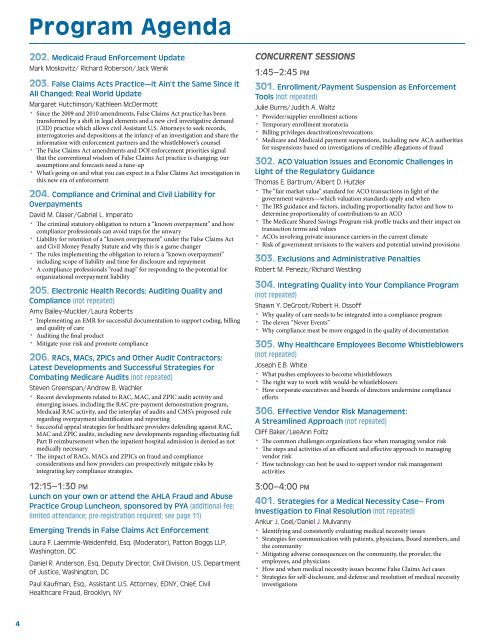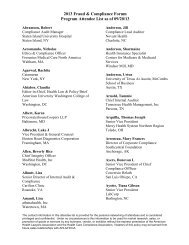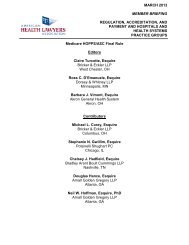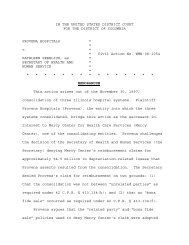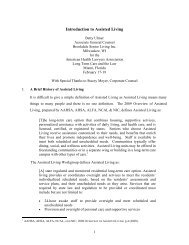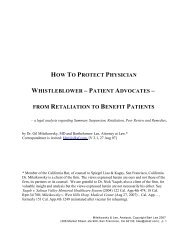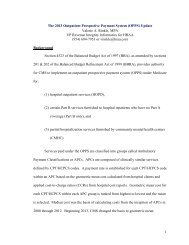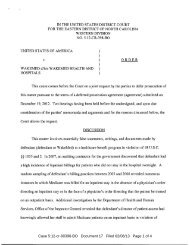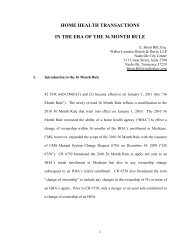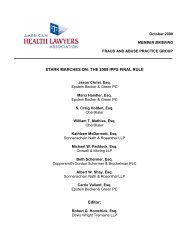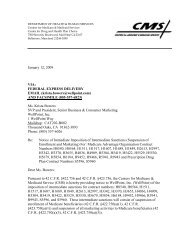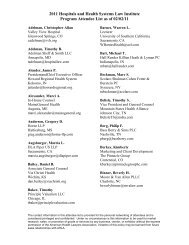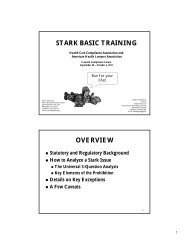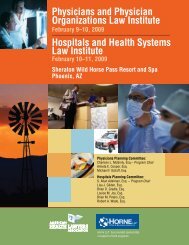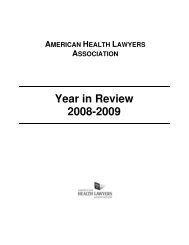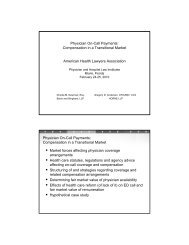brochure - The American Health Lawyers Association
brochure - The American Health Lawyers Association
brochure - The American Health Lawyers Association
You also want an ePaper? Increase the reach of your titles
YUMPU automatically turns print PDFs into web optimized ePapers that Google loves.
4<br />
Program Agenda<br />
202. Medicaid Fraud Enforcement Update<br />
Mark Moskovitz/ Richard Roberson/Jack Wenik<br />
203. False Claims Acts Practice—It Ain’t the Same Since It<br />
All Changed: Real World Update<br />
Margaret Hutchinson/Kathleen McDermott<br />
••Since the 2009 and 2010 amendments, False Claims Act practice has been<br />
transformed by a shift in legal elements and a new civil investigative demand<br />
(CID) practice which allows civil Assistant U.S. Attorneys to seek records,<br />
interrogatories and depositions at the infancy of an investigation and share the<br />
information with enforcement partners and the whistleblower’s counsel<br />
••<strong>The</strong> False Claims Act amendments and DOJ enforcement priorities signal<br />
that the conventional wisdom of False Claims Act practice is changing; our<br />
assumptions and forecasts need a tune-up<br />
••What’s going on and what you can expect in a False Claims Act investigation in<br />
this new era of enforcement<br />
204. Compliance and Criminal and Civil Liability for<br />
Overpayments<br />
David M. Glaser/Gabriel L. Imperato<br />
••<strong>The</strong> criminal statutory obligation to return a “known overpayment” and how<br />
compliance professionals can avoid traps for the unwary<br />
••Liability for retention of a “known overpayment” under the False Claims Act<br />
and Civil Money Penalty Statute and why this is a game changer<br />
••<strong>The</strong> rules implementing the obligation to return a “known overpayment”<br />
including scope of liability and time for disclosure and repayment<br />
••A compliance professionals “road map” for responding to the potential for<br />
organizational overpayment liability<br />
205. Electronic <strong>Health</strong> Records: Auditing Quality and<br />
Compliance (not repeated)<br />
Amy Bailey‑Muckler/Laura Roberts<br />
••Implementing an EMR for successful documentation to support coding, billing<br />
and quality of care<br />
••Auditing the final product<br />
••Mitigate your risk and promote compliance<br />
206. RACs, MACs, ZPICs and Other Audit Contractors:<br />
Latest Developments and Successful Strategies for<br />
Combating Medicare Audits (not repeated)<br />
Steven Greenspan/Andrew B. Wachler<br />
••Recent developments related to RAC, MAC, and ZPIC audit activity and<br />
emerging issues, including the RAC pre-payment demonstration program,<br />
Medicaid RAC activity, and the interplay of audits and CMS’s proposed rule<br />
regarding overpayment identification and reporting<br />
••Successful appeal strategies for healthcare providers defending against RAC,<br />
MAC and ZPIC audits, including new developments regarding effectuating full<br />
Part B reimbursement when the inpatient hospital admission is denied as not<br />
medically necessary<br />
••<strong>The</strong> impact of RACs, MACs and ZPICs on fraud and compliance<br />
considerations and how providers can prospectively mitigate risks by<br />
integrating key compliance strategies.<br />
12:15–1:30 pm<br />
Lunch on your own or attend the AHLA Fraud and Abuse<br />
Practice Group Luncheon, sponsored by PYA (additional fee;<br />
limited attendance; pre-registration required; see page 11)<br />
Emerging Trends in False Claims Act Enforcement<br />
Laura F. Laemmle‑Weidenfeld, Esq. (Moderator), Patton Boggs LLP,<br />
Washington, DC<br />
Daniel R. Anderson, Esq, Deputy Director, Civil Division, U.S. Department<br />
of Justice, Washington, DC<br />
Paul Kaufman, Esq., Assistant U.S. Attorney, EDNY, Chief, Civil<br />
<strong>Health</strong>care Fraud, Brooklyn, NY<br />
CONCURRENT SESSIONS<br />
1:45–2:45 pm<br />
301. Enrollment/Payment Suspension as Enforcement<br />
Tools (not repeated)<br />
Julie Burns/Judith A. Waltz<br />
••Provider/supplier enrollment actions<br />
••Temporary enrollment moratoria<br />
••Billing privileges deactivations/revocations<br />
••Medicare and Medicaid payment suspensions, including new ACA authorities<br />
for suspensions based on investigations of credible allegations of fraud<br />
302. ACO Valuation Issues and Economic Challenges in<br />
Light of the Regulatory Guidance<br />
Thomas E. Bartrum/Albert D. Hutzler<br />
••<strong>The</strong> “fair market value” standard for ACO transactions in light of the<br />
government waivers—which valuation standards apply and when<br />
••<strong>The</strong> IRS guidance and factors, including proportionality factor and how to<br />
determine proportionality of contributions to an ACO<br />
••<strong>The</strong> Medicare Shared Savings Program risk profile tracks and their impact on<br />
transaction terms and values<br />
••ACOs involving private insurance carriers in the current climate<br />
••Risk of government revisions to the waivers and potential unwind provisions<br />
303. Exclusions and Administrative Penalties<br />
Robert M. Penezic/Richard Westling<br />
304. Integrating Quality into Your Compliance Program<br />
(not repeated)<br />
Shawn Y. DeGroot/Robert H. Ossoff<br />
••Why quality of care needs to be integrated into a compliance program<br />
••<strong>The</strong> eleven “Never Events”<br />
••Why compliance must be more engaged in the quality of documentation<br />
305. Why <strong>Health</strong>care Employees Become Whistleblowers<br />
(not repeated)<br />
Joseph E.B. White<br />
••What pushes employees to become whistleblowers<br />
••<strong>The</strong> right way to work with would-be whistleblowers<br />
••How corporate executives and boards of directors undermine compliance<br />
efforts<br />
306. Effective Vendor Risk Management:<br />
A Streamlined Approach (not repeated)<br />
Cliff Baker/LeeAnn Foltz<br />
••<strong>The</strong> common challenges organizations face when managing vendor risk<br />
••<strong>The</strong> steps and activities of an efficient and effective approach to managing<br />
vendor risk<br />
••How technology can best be used to support vendor risk management<br />
activities<br />
3:00–4:00 pm<br />
401. Strategies for a Medical Necessity Case– From<br />
Investigation to Final Resolution (not repeated)<br />
Ankur J. Goel/Daniel J. Mulvanny<br />
••Identifying and consistently evaluating medical necessity issues<br />
••Strategies for communication with patients, physicians, Board members, and<br />
the community<br />
••Mitigating adverse consequences on the community, the provider, the<br />
employees, and physicians<br />
••How and when medical necessity issues become False Claims Act cases<br />
••Strategies for self-disclosure, and defense and resolution of medical necessity<br />
investigations


